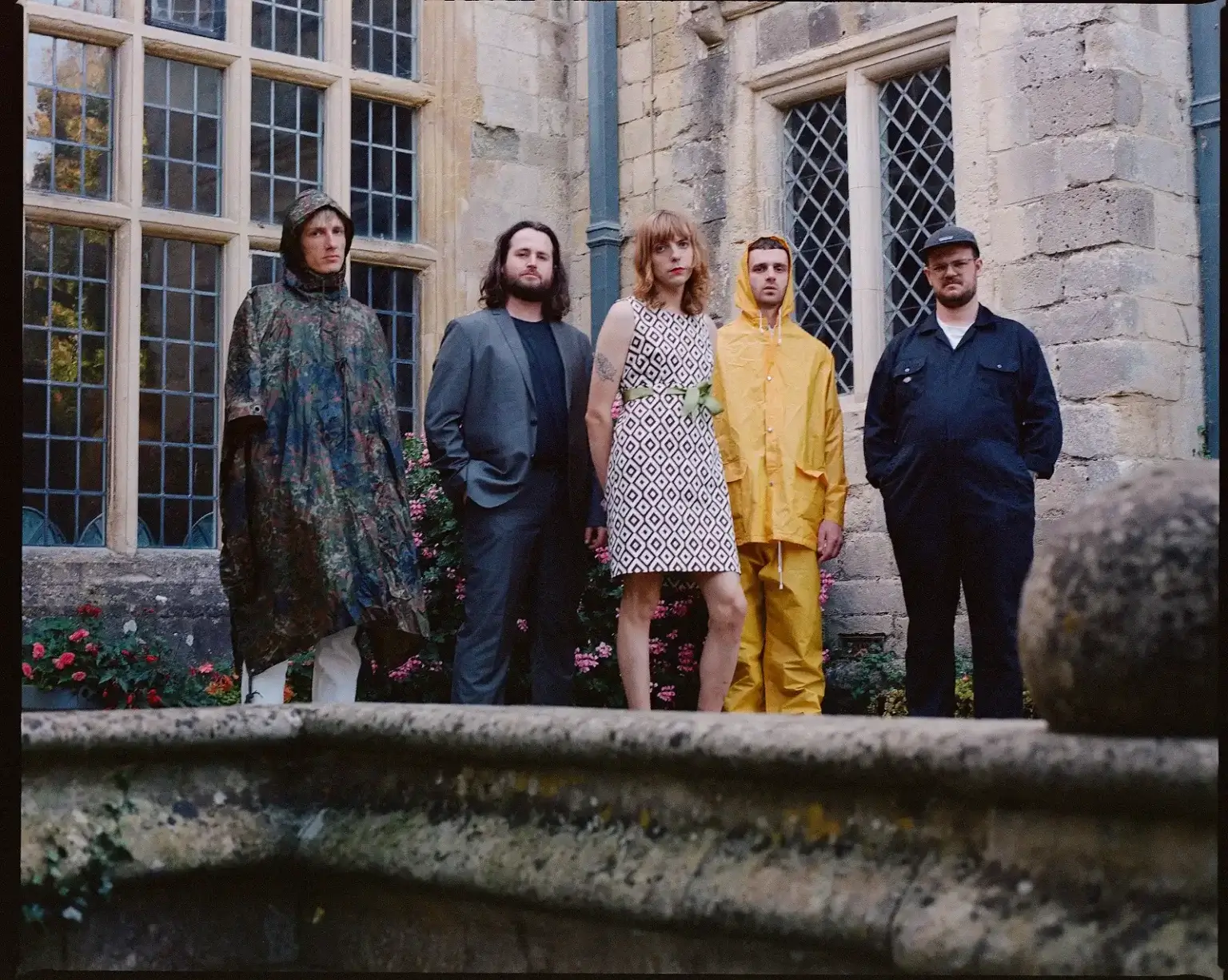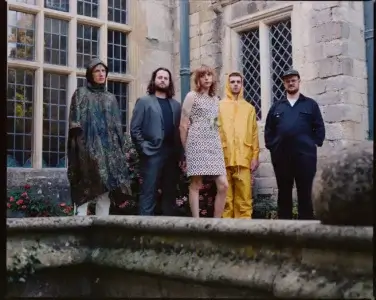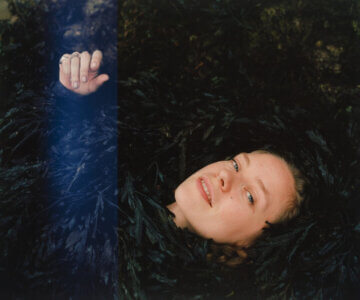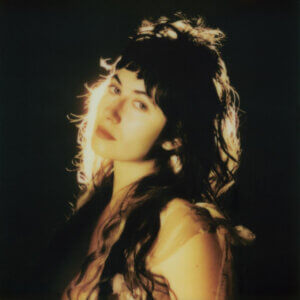DITZ’s ‘Never Exhale’ is the Product of a Chaotic Two Years

Brighton indie punk band DITZ is back with Never Exhale, their sophomore record, on January 24. While there’s a sense of free association and immediacy in the record’s lyrics and music—mostly because the band was writing and recording them in the middle of touring—creating that effect could only be achieved by a band with technical skill and a trained ear for good composition. Lush guitar parts building up into a total crash out of noise, lyrics that verge into the surreal, and an epic finale that takes the form of a classical symphony: Never Exhale is DITZ’s most ambitious and expansive project yet.
Ahead of Never Exhale’s release this Friday, Northern Transmissions talked to composer and guitarist Jack Looker and lyricist and vocalist Cal Francis of DITZ. Amidst in-depth, albeit slightly off-topic, discussions of good (and bad) records, the pitfalls of streaming culture, and the difference in quality between live music and their recorded versions, the band gave much insight on their writing process, their favorite tracks, and how they managed to pull off Never Exhale in the few moments of spare time they had.
NT: Your record Never Exhale comes out this week; that’s really exciting! I listened to it, and it’s a really good sophomore album. Before we get into the content and the songs themselves, I wanted you guys to shed a little more detail on the timeline and production of the album. You’ve been all around the world since your last record [The Great Regression (2022)], and I feel like a lot of that really comes through in the music.
JL: “Rushed” isn’t the best word for it because we didn’t really rush into every moment. It’s more like every part of the record seemed rushed because we didn’t have as much time as put into it as we’d have liked to, you know? It’s hard to say that there’s any rush when there’s nearly two years between the first album and the second one, but it was a bit hectic.
CF: Yeah, “rushed” isn’t a good word, but I think the time that we had was like…It’s just that we didn’t have very much time. [Getting the album out] kind of felt like being on a game show. It was like, they ask a question, and you’ve already got 10 seconds to answer it—that’s what it felt like to me. We just felt like we had to come up with the first thing that came to our heads a lot of the time, and then that is the result. What I like about it is that it’s so immediate. In the case of most of the songs, they were the first thing that we had [for a new record]. I think the timeline is reflected within the content of the album.
NT: I agree. To me that does come through, especially when it comes to the ambiguity of the lyrics and the music. Something I noticed is that, on a lot of the tracks, the music is so constant, and it keeps rumbling—like there’s this inability to stop. I’d like to know more about the lyric-writing process and how the music came together. What kind of sounds were you looking for when you were writing it, and how’d you channel this vaguer, looser writing style?
JL: I think…I mean, the music was written, and then the lyrics were written afterwards…Well, not really this time…That’s probably complete bullshit, actually.
CF: It was written in tandem with, or separately too even then, and then added together…I think.
JL: Yeah…
CF: But yeah, I think the way that [the music] impacted the writing of the album is that there are quite a lot of different songs on this album. I mean, as we’re talking now, our next single [“Four”] comes out tomorrow [January 21]. I was just thinking about this one, about how different it is from the other two, which are, in a way, two of the more traditional songs on the record. I think because the timeline was so stretched—but also stressed in that it existed sort of only in the time that we had for it, which was already split apart quite widely—there’s a lot of variety depending on what we were doing, or what headspace we were in. There might be six months in between some of these tracks, and I think that’s something that shows up a lot. When I think about the variety of the album, I just think, ‘Oh, that’s because we were at that [song] six months before we wrote that other one, and that one came six months after that.’
JL: The oldest track [on Never Exhale] comes almost straight after the first album in its origin. I guess conceptions of completion kind of span the two, three years—or however long it took for just the first one to be recorded. And it’s great to think that this time last year, we were recording it, actually.
CF: Yeah, what day was it? Was it the 10th of January or something like that?
JL: We finished on the 20th , so we finished it 365 days today. Actually, I’ll check…Ok, we finished on the 21st !
NT: Oh, that’s awesome; happy anniversary, I guess!
JL: Anyway, we’re not a band that like, sits and jams every time, except for the odd occasion when half decent ideas come to fruition. Whenever we jam it ends up sounding like the fucking Blues Brothers, or something really cringe and shit. Usually one person has an idea—whether that’s a complete song or the main foundation of the song—and then we all come in to either learn the parts or make our own parts. But yeah, we’re never really in the same room writing. We did it a few times with the last single “Taxi Man”; we did that in the same room. But that also took a full day for it to happen really, didn’t it?
CF: That was one of those moments where we felt we were really pressed for time as well.
JL: When was that? Was that June? It was summer, wasn’t it? I remember it was warm enough because we did it in this old, World War II bunker [in Cologne, Germany]. I remember enjoying being down there because it was 20 feet underground and not 35°C like it was outside.
CF: Yeah, I kind of forgot about that; it was really warm outside!
JL: And as you got down the steps, like it went down really far; it was bliss.
CF: Oh, you’ll like this: I was playing GeoGuessr earlier, and I got that bridge in Cologne—like I was back on it. I got a perfect score. It was so good because I saw it, I saw the cathedral, and I was like, ‘Oh, I know exactly where I am!’
NT: Wait, so how did you end up in a German World War II bunker and manage to write a song there?
JL: We’ve got some friends where, for the first time we played in Cologne, they played with us, and we kind of became friends. We had two days off there in the middle of the tour. We just asked if they knew any rehearsal places and they said, ‘Oh, we’ve got a room in this old World War II bunker east of Cologne.’ That all sounded sick, obviously, so we went over there for two days or so. It was like the best commute to work— I mean I told myself it was a commute to work when it felt more like a commute to go piss around on my guitar all day—but yeah, it was the best to like, get up and ride a little scooter over a bridge to get there. It was really cool.
CF: I just remember what else was good was that we spent all of Anton [Mocock]’s Ibis points and got Accor.
JL: Yeah, we were in a really nice hotel with a swimming pool. We usually stay in absolute shit—well okay, we don’t do that, we usually stay in the most basic hotel.
CF: To have a swimming pool in a nice leafy suburb of Cologne was the best! I’d like to go back and reserve a day off for that.
JL: Oh, we will!
NT: So just to clarify the timeline, you guys were recording [Never Exhale] as the tour was happening?
JL: We recorded it in two weeks this time. We finished [Never Exhale] a year ago tomorrow.
CF: But then we did have two days, and then we worked on it for two weeks, another week a bit later, and then finally a month a long time after that.
JL: To be fair, the recording was the start of touring last year, so we technically did do it on tour.
CF: Ok yeah, it definitely felt like it because we were in London, and that was, you know, awful…God, I hate London: it’s so big and full of dickheads as well. It’s just the worst…I mean I probably wouldn’t like New York either for the same reasons, though.
NT: Okay, back to the album. I want to talk about one song in particular because it’s both the literal finale, as well as the crowning piece of the record, combining all the sounds and themes previously expressed in [Never Exhale]. There’s a bit of ambient, a bit of harsh noise, the poetic speech-song style post-punkers seem to be into these days, and obviously punk and shades of some rock revival in “britney,” so I was wondering if you guys could talk about the writing process for this track.
JL: I first wrote the music at my parents’ house back in Midlands like, the day before I went to my gran’s funeral. Well, we went to a few family funerals last year, so at least before one of them.
When I listen to a band, I basically just start writing like them, you know? Like, if I’m listening to the Beatles, I’ll just write about ten songs that sound like the Beatles, which will never make it onto the record, obviously. Or if I’m listening to loads of Queens of the Stone Age, then I’ll probably make something that sounds like that. [For “britney,”] I think I was in the transition between listening to loads of different bands and not really finding anything I couldn’t
be obsessed with for a bit. It draws from a lot of places: there’s bits of Jockstrap and Mogwai, and like, I don’t know, lots of stoner bands like Sleep—lots of shit like that and there. There are a few others as well, which now on the spot, I can’t remember.
CF: Yeah, I think when you first showed me [“britney”], I don’t think you really thought we’d take it on. When you first sent that demo, I was like, ‘That sounds like a challenge!’ I quite liked writing the lyrics for it because I just felt like there are bits in it that are nothing we had ever done before. I think of it as a whole song; I don’t think about how deconstructed it all is. There’s those bits where like…when it first comes out to just the guitar, it is literally just the guitar. It’s very episodic in that way. Each movement is totally different from the last one, but they all fit together really well.
JL: It’s got a sprinkle of Pure Adult in there as well, hasn’t it? That’s another New York band by a friend of ours called Jeremy [Snyder]. The way he and Bianca [Abarca] write could be thought of as epic movements in classical music. [“britney”] is like that, but condensed down a little bit.
CF: Yeah, I reckon Jeremy would tell you that he gets all that from Xiu Xiu or something. But it’s the Scott Walker thing as well. On all those weird albums where it’s more like an opera or something like that, where it sort of moves through a different, ‘part one and part two’ type of thing. But I think that’s what I like about “britney.” How winding it is: I like any good story that’ll always throw you somewhere that you didn’t think you were going to be.
JL: I like that it’s slower than most of what we’ve done, and it feels like it’s still got a bit of tension and release after everything before it. And there’s a spookiness to it as well, which is a word that seems to get thrown around a bit because a lot of people we’ve spoken to say our music’s terrifying…which I think that’s great, I love that!
CF: I think the tension comes from the patience of it as well. Like it’s busy, but it’s not at the same time because, you know, the words are quite fast and spaced out.
JL: I really enjoyed just leaving loads of space in there. A lot of what we do is just congested: layers of guitars, or layers of this and layers of that. So just to have that weird, anthemic kind of part where it’s just that one guitar made it feel like the whole thing had come together in a new way.
CF: Yeah, it gives me space to ebb and flow over it—like, switch up the rhythm. If you write something that’s really, really busy, you’re locked into a pattern that’s already been created with every other instrument that’s parked there. So that’s what I like about that song.
JL: I mean it’s the antithesis of “Space/Smile,” isn’t it?
CF: Yeah, I think you nailed that, to be honest. It is kind of the antithesis; it’s the opposite of “Space/Smile.” I really like “Space/Smile” as the first single. I think that was a really good choice because I really like the short, fast ones. Because it’s shocking, you know? It’s a statement. But when I listen to an album, I actually prefer it to be made up with more tracks like “britney,” where I could really feel like I achieved something by listening to it, rather than getting a quick dopamine hit, you know? Something to dive into…I’m actually really curious to see what people are going to say about that. I mean, lots of people bring it up in interviews to be fair, but I’m curious to see what other people might say.
JL: Someone filmed it when we played it at the Logan—like the whole thing.
CF: Oh, I haven’t watched that. Was it good?
JL: Nah, it doesn’t sound very good. It’s too quick, and we all make mistakes in it. It was the first time we played it, so it was…well the worst one to film.
CF: Well, you know the other day I saw a video where Franz Ferdinand played “Take Me Out.” It was like the first time they had ever played it. You that really slowed-down bit—the part in the song where it finally gets to the main riff and punches through? Well, it was totally awful.
JL: I saw a video of them recently playing “Bigmouth Strikes Again” with Johnny Marr.
CF: I listened to their new album the other week! It’s shit.
NT: Yeah…Well I don’t think they’ve made anything different since the Self-Titled album. I love their self-titled record—it’s one of my favorites of all time, it’s legendary—but yeah. Everything after feels like “Take Me Out”: the album. Both: Yeah.
CF: Well, to be fair, that’s a really good track off [Franz Ferdinand]. And also “Jacqueline.”
JL: Yeah, especially when that guitar comes in! [“Jacqueline”] is a good example of songs being episodic in structure. Because it starts off with that little, bright guitar bit, and then the bass comes in, and it really builds.
CF: It’s like Franz Ferdinand did “The Chain” by Fleetwood Mac—that’s what it feels like.
JL: Haha, I think you did a disservice to Fleetwood Mac, but I see where you’re coming from.
CF: You know what? I’ll say it: I prefer to listen to the Self-Titled Franz Ferdinand album than any Fleetwood Mac album.
JL: Ok but I thought you loved Tusk, though! That’s the worst one; Tusk is shite.
CF: I like Tusk because it’s so ridiculous. It’s like they listened to Talking Heads once and said, ‘Oh we like this!’ And then they heard The B52s or something like that and said, ‘Yeah, no, this is gonna be the new thing!’
JL: ‘Here’s what the kids are into!’
CF: And then they did loads of cocaine.
JL: You know what? Let’s just make a fuckin’ drill album for our next record. Drill with guitars.
CF: We can’t afford the loads of cocaine though, so that part’s going to have to wait.
JL: Yeah, and we can’t afford the other instruments either, so it will just have to be guitars.
NT: Alright, so back to your album: I’m also curious to see the reception of “britney.” Another thing that, to me, proves the effectiveness of that song as the endpiece is that it’s the immediate follow-up to “The Body as a Structure,” which is the record’s loosest song. It has this interesting formlessness to it—it’s slowing down before building up into the explosive end—and then you also get into that loose, trailing-off speech-singing. It stands out from the rest of the album in its own, peculiar way. I’d love to know more about it, as well as its relationship to “britney.”
CF: I think that that’s my favorite to play live.
JL: I love it too.
CF: I actually don’t like the recording as much as when we play it live. It’s one of the ones where I feel—I can’t quite name it—but that build up we made has a bit more energy live. There’s something about the tempo when we do it live, as well: it speeds up in a really natural, exciting way…There’s lots of stuff in [“The Body as a Structure”] that we had never done before.
JL: That middle bit took ages to get right as well. Sam [Evans], our drummer, ended up writing it at the end. I remember we did a few rehearsals, and whatever had come out for that part where CF starts singing just sounded awful. Well, it just didn’t work, did it? …It’s probably the song we spent the longest on, I think. “britney” wasn’t so much; we kind of did that in one rehearsal over two days and just learned it.
CF: Yeah, that’s true. And there were a few reasons we spent so long on “The Body as a Structure.” We did [Jack’s] original demo once, and then we straightened up the way the instrumentals (acting in a way you’d think a chorus would) were played. I remember it was groovy before, so we made it sound a bit more urgent. And then it was just doing that middle bit over and over and over again—different versions of it until we finally had something that actually worked.
JL: Thanks to Sam, there.
CF: I think the key part is that drum, just like, not taking it off the snare. Because [Sam] really really wanted to go to the hi-hats, and we were like, ‘No, no! Just keep on it!’
JL: He goes really loose at the end as well, which I’ll be honest, kind of irritated me at the time, but now I like it. With the visual aspects of the lyrics of bodies and organs, I like the way the drums are flailing. It’s like he’s not playing it right, but it’s deliberate at the same time. I think he knew subconsciously what he was doing.
CF: [“The Body as a Structure”] is another weird standout on the album, by both being pretty good and by being different from the rest of them.
JL: I’m just worried nobody’s going to listen to them because they’re right at the end.
CF: I feel like your brain gets manipulated by Spotify algorithms in that regard. I feel people will still pick them as their favorites, you know? On the first album, “hehe” and “Teeth” are towards the end, but if you ask people and actually talk to them, they’ll say that those two are some of their favorites. That’s one thing that’s really similar to the first album. We’ve just frontloaded it with all of the bangers basically, and then everything that’s messing around and trying to do something a bit different is at the end. I don’t know why we do that!
NT: Yeah, I was about to ask if that was instinctual. I think I came to appreciate [Never Exhale] because I’m just an album person; I like listening to music front-to-back. I don’t like the playlist structure that Spotify and all of these streaming services have been pushing.
CF: This! I listen to albums all day, every day, and I won’t listen to anything in any other form unless I’m forced to because somebody else put it on. There is no other way I’d rather listen to music.
JL: That’s the way the artist intended.
CF: Exactly! [A record’s] also usually about the perfect length of something that I want to do. I want to do something that’s longer than a standard album, I’ll just put on a longer album. The album as a concept is just like, perfect. The other thing that I hate about playlists is that the volumes of the songs are all different.
You’ll start with one volume and have to turn it up and down as we’re listening to it. I don’t know, unless people are starting to check the keys of the songs before they put them in playlists, they’re always just really jarring. It also just sounds like being in a shop! Like, you’re walking into a mall or something, and it’s just different songs, one after the other, coming from everywhere. Here’s Rag’n’Bone Man; here’s, you know, whoever else is big these days. I can’t stand a playlist. It’s genuinely my least favorite thing—at least it’s definitely up there.
NT: A playlist also removes the original context of all the music you’ve written. In Never Exhale, for instance, if you hear “V70” in a playlist, no one’s going to get it. Nobody is going to know why you have a purely instrumental track, why it’s there at the beginning, and how it sets up the rest of the record. Likewise, “britney” also sounds really good because it’s right next to “The Body as a Structure.”
CF: Yeah, you got that huge ending [in “The Body as a Structure”’], and then it leads right into [“britney’s”] really bare guitar. That kind of flow is something that we only plan after we’ve got the songs. But once we had them, it almost became really obvious for us to put them together. We didn’t really debate it too much. It was things like, ‘Oh, so for the start the second side, that’s probably going to have to be “Smells Like Something Died in Here” because it’s a good point to build off.’ And then there’s the moment when “Four” goes into “God on Speed Dial” where the [plucky] guitar part goes straight through. When it’s all done, [the final track sequence] becomes obvious, but we didn’t know that when we were writing them.
NT: One thing that I found really curious about the lyrics in particular is that it has this formless, almost spiritual aspect to it. You ended up name-dropping a lot of spiritual (and political) figures throughout the record and almost meshing them together. So even though it is a snapshot of how you guys have been thinking, as well as this kind of immediacy of thought, how did that manifest into this weird spiritual angle?
CF: I wrote everything in a stream of consciousness, and then I chopped and edited it. I’m not religious or anything, but the Bible, to me, is the originator of most tropes that you hear in storytelling, at least anywhere in the West. So, I think it’s quite natural: the UK is not a very religious country anymore, but some of the earliest stories that I would hear at school would be stories from the Bible. It’s almost like the best storybook in the world, you know? It’s also along the lines of that Simpsons thing, where people say, ‘You can write anything you want, but Matt Groening and The Simpsons writers probably already wrote that.’ I think the same is true of the Bible because it’s pretty dense; it’s got a lot of different narratives in there.
I think it’s good practice to dig through it for inspiration. And like, I don’t know. Most people when they write a song—especially in punk music, or whatever you want to call whatever it is that we and all our friends do—they’re always trying to teach a lesson. There’s always a moral or something. It’s often on the nose and direct, but [that kind of storytelling] is rooted in the Bible, at least I think so…I think I struggle to write something really straight up, so calling
for common tropes that people have experienced is an easier way for me to write something that they’re going to be able to relate to. Everybody knows at least something that’s in that book because it’s been around forever, and you’ve probably heard parts from somebody else. I like that it creates some strings of relevance to other people.
NT: Is there anything people should take away from Never Exhale?
JL: Listen to it as an album, not in a fuckin’ playlist.
CF: Yeah, you’ve said it so I don’t have to, thank you.
Pre-order Never Exhale by Ditz HERE
Latest Reviews
Tracks
Related
Advertisement
Looking for something new to listen to?
Sign up to our all-new newsletter for top-notch reviews, news, videos and playlists.









